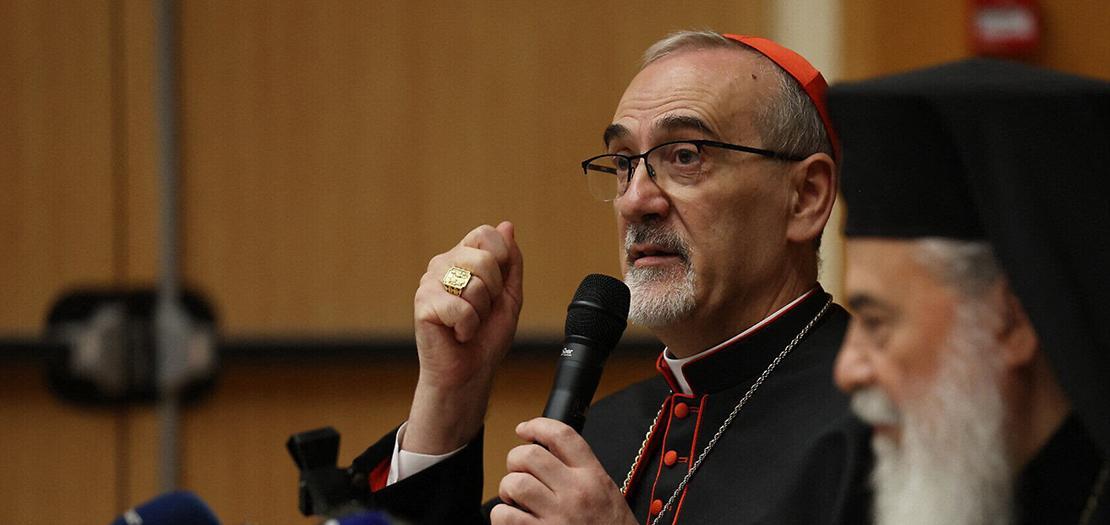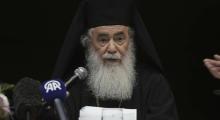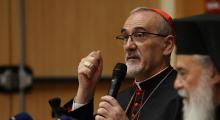Issued by the Catholic Center for Studies and Media - Jordan. Editor-in-chief Fr. Rif'at Bader - موقع أبونا abouna.org

Following is the text of the opening statement of His Beatitude Cardinal Pierbattista Pizzaballa, Latin Patriarch of Jerusalem, at the joint press conference held at Notre Dame of Jerusalem Centre on 22 July 2025:
“We are sorrowful yet always rejoicing; as poor yet enriching many; as having nothing and yet possessing all things.” (2 Corinthians 6: 10)
Dear brothers and sisters,
Patriarch Theophilos III and myself, have returned from Gaza with broken hearts. But also encouraged by the testimony of many people we met.
We entered a place of devastation, but also of wonderful humanity. We walked through the dust of ruins, past collapsed buildings and tents everywhere: in courtyards, alleyways, on the streets and on the beach — tents that have become homes for those who have lost everything. We stood among families who have lost count of the days of exile because they see no horizon for a return. Children talked and played without batting an eyelid —they were already used to the noise of the bombing.
And yet, in the midst of all this, we encountered something deeper than the destruction: the dignity of the human spirit that refuses to be extinguished. We met mothers preparing food for others, nurses treating wounds with gentleness, and people of all faiths still praying to the God who sees and never forgets.
Christ is not absent from Gaza. He is there — crucified in the wounded, buried under rubble and yet present in every act of mercy, every candle in the darkness, every hand extended to the suffering.
We have not come as politicians or diplomats, but as pastors. The Church, the entire Christian community, will never abandon them.
It is important to emphasize and repeat that our mission is not for a specific group, but for all. Our hospitals, shelters, schools, parishes — St. Porphyrius, the Holy Family, the Al-Ahli Arab Hospital, Caritas — are places of encounter and sharing for all: Christians, Muslims, believers, doubters, refugees, children.
Humanitarian aid is not only necessary — it is a matter of life and death. Refusing it is not a delay, but a sentence. Every hour without food, water, medicine and shelter causes deep harm.
We have seen it: Men holding out in the sun for hours in the hope of a simple meal. This is a humiliation that is hard to bear when you see it with your own eyes. It is morally unacceptable and unjustifiable.
We therefore support the work of all humanitarian actors — local and international, Christian and Muslim, religious and secular — who are risking everything to bring life to this sea of human devastation.
And today we raise our voices in an appeal to the leaders of this region and the world: there can be no future based on captivity, displacement of Palestinians or revenge. There must be a way that restores life, dignity and all lost humanity. We make the words of Pope Leo XIV from last Sunday’s Angelus our own:
“I renew my appeal to the international community to observe humanitarian law and to respect the obligation to protect civilians, as well as the prohibition of collective punishment, the indiscriminate use of force and the forced displacement of the population.”
It is time to end this nonsense, end the war and put the common good of people as the top priority.
We pray — and call — for the release of all those deprived of freedom, for the return of the missing, the hostages and for the healing of long-suffering families on all sides.
When this war is over, we will have a long journey ahead of us to begin the process of healing and reconciliation between the Palestinian People and the Israeli People, from the too many wounds this war has caused in the lives of too many: a genuine, painful and courageous reconciliation. Not forgetting, but forgiving. Not erasing wounds, but transforming them into wisdom. Only such a path can make peace possible — not only politically, but also humanly.
As shepherds of the Church in the Holy Land, we renew our commitment to a just peace, to unconditional dignity and to a love that transcends all borders.
Let us not turn peace into a slogan, while war remains the daily bread of the poor.







